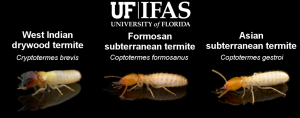Plus, new environmental protection funding
 Termite swarm season is rapidly approaching, converting Indian gaming proceeds to help protect Florida’s environment, including flood protection, and putting an end to proposed local heat protections for outdoor workers. It’s all in this week’s Environmental and Engineering Digest.
Termite swarm season is rapidly approaching, converting Indian gaming proceeds to help protect Florida’s environment, including flood protection, and putting an end to proposed local heat protections for outdoor workers. It’s all in this week’s Environmental and Engineering Digest.
 Invasive Termites in Season: Florida researchers are warning that the termite swarms of today are much different than those from even 20 years ago. Invasive species of termites, specifically the Asian Subterranean Termite and the Formosan Subterranean Termite dig underneath houses and can’t be killed with typical fumigation methods causing them to flare up in frequency and range – especially during recent warmer years. Some of the larger invasive colonies can eat up to 900 pounds of wood a year, and they are about to enter swarming season: the Asian Termites swarm through March, then the Formosan from late April to early May, with the more prototypical West Indian drywood termites swarming from early May through June. Entomologists at the University of Florida say all three are active this season. They’ve compiled over 30 years of data from exterminators across the Sunshine State to create an interactive map to help homeowners gauge nearby termite sightings and densities. Helping homeowners spot signs of termites before it’s too late is extremely important, as insurance policies generally do not cover termite damage, only some of the water damage that can help attract the vermin.
Invasive Termites in Season: Florida researchers are warning that the termite swarms of today are much different than those from even 20 years ago. Invasive species of termites, specifically the Asian Subterranean Termite and the Formosan Subterranean Termite dig underneath houses and can’t be killed with typical fumigation methods causing them to flare up in frequency and range – especially during recent warmer years. Some of the larger invasive colonies can eat up to 900 pounds of wood a year, and they are about to enter swarming season: the Asian Termites swarm through March, then the Formosan from late April to early May, with the more prototypical West Indian drywood termites swarming from early May through June. Entomologists at the University of Florida say all three are active this season. They’ve compiled over 30 years of data from exterminators across the Sunshine State to create an interactive map to help homeowners gauge nearby termite sightings and densities. Helping homeowners spot signs of termites before it’s too late is extremely important, as insurance policies generally do not cover termite damage, only some of the water damage that can help attract the vermin.

Wolfe Creek Forest in Santa Rosa County, Florida. Courtesy, Florida Wildlife Corridor Foundation
Gaming Revenues to Fund Environmental Protection: This past Thursday, the Governor signed into law SB 1638, which provides $150 million to overhaul the Central and South Florida Water Management System, which directs clean water to over nine million Floridians and helps prevent flooding. The bill also directs 96% of the revenue from the recent Seminole Tribe Compact, which is approximately $750 million per year, to broader water quality improvement, infrastructure, and conservation land acquisition and management. Some of this funding is to conduct a health study on Lake Okeechobee in collaboration with the Florida Gulf Coast University Water School for future vegetation control of both invasive and native species. Other monies will go toward expansion of the Florida Wildlife Corridor and other environmental projects, including continuing efforts to convert properties using septic tanks to sewer systems.
 Florida Waits for Federal Heat Protections: A wave of proposed heat protection measures for outdoor workers that was started in Miami-Dade County have been outright banned by the Florida Legislature. SB 1492 prohibits any local laws requiring heat exposure provisions for employers, to the dismay of an organizing movement across parts of South Florida. As a result, the Miami-Dade County Commission has shelved its local bill. Even before the state law passed, most commissioners were opposed to it, citing unnecessary regulation targeting Florida’s construction and agricultural industries. Critics have pointed to the fact that OSHA should protect workers from all unsafe conditions – heat included – rendering any local protections redundant. As we’ve reported, OSHA has developed a proposed standard that would entitle workers to extra breaks during hotter months. Workplaces would also need to better prepare their workers for heat-related health problems.
Florida Waits for Federal Heat Protections: A wave of proposed heat protection measures for outdoor workers that was started in Miami-Dade County have been outright banned by the Florida Legislature. SB 1492 prohibits any local laws requiring heat exposure provisions for employers, to the dismay of an organizing movement across parts of South Florida. As a result, the Miami-Dade County Commission has shelved its local bill. Even before the state law passed, most commissioners were opposed to it, citing unnecessary regulation targeting Florida’s construction and agricultural industries. Critics have pointed to the fact that OSHA should protect workers from all unsafe conditions – heat included – rendering any local protections redundant. As we’ve reported, OSHA has developed a proposed standard that would entitle workers to extra breaks during hotter months. Workplaces would also need to better prepare their workers for heat-related health problems.
LMA Newsletter of 4-8-24

